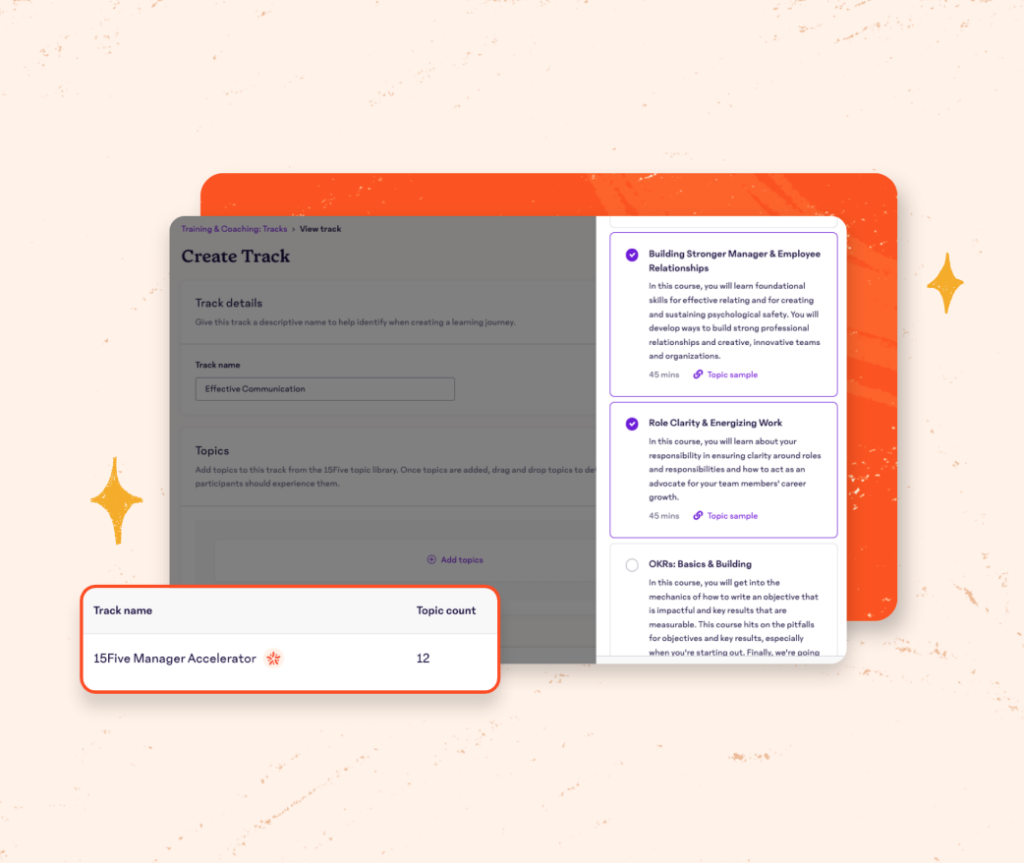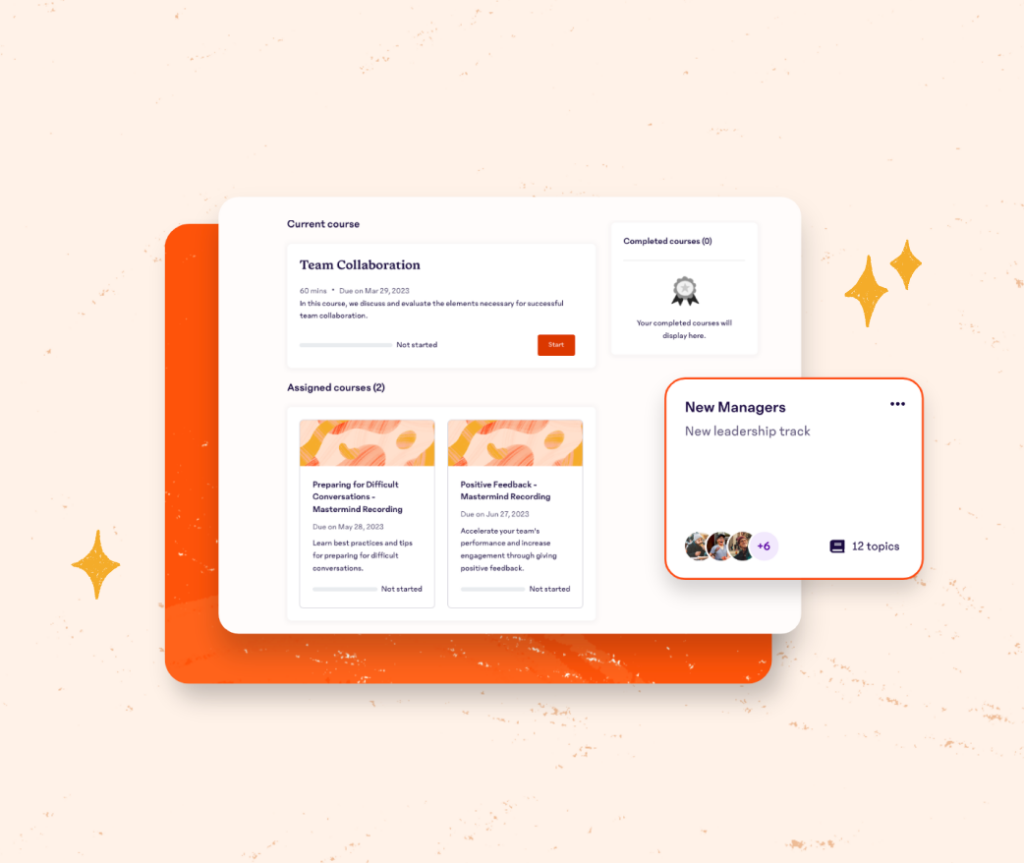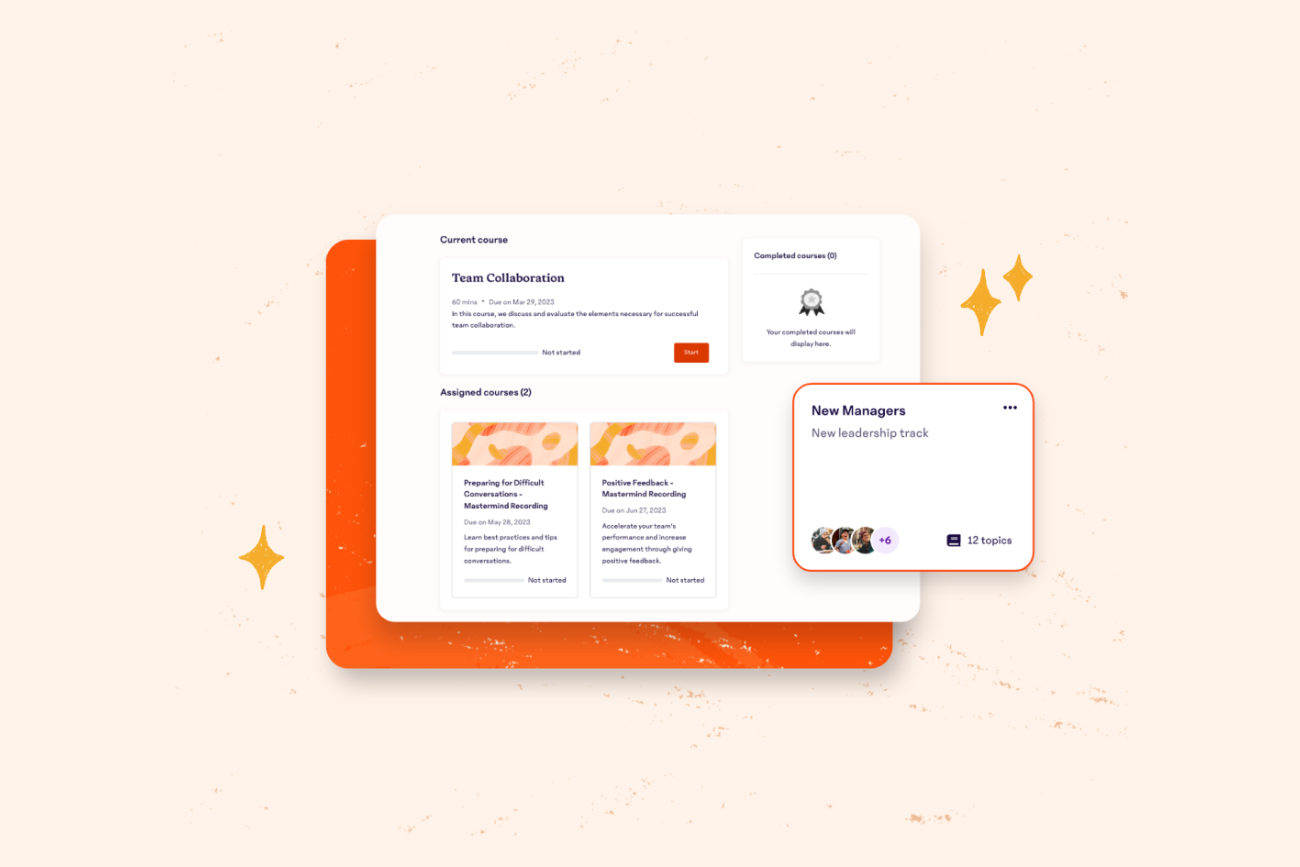Getting the Most From Your Managers: Introducing Transform Tracks and Custom Learning Journeys
Manager effectiveness is a major driver of employee engagement, and managers have a large impact on their direct reports’ morale and performance. Yet, many managers often struggle to lead because they don’t have necessary skills to drive engagement and performance in the evolving workplace. As a result, many employees don’t see their managers as strong leaders.
In fact, in our 2023 Manager Effectiveness Report, we found that only 37% of employees are impressed with their manager’s ability to lead. Furthermore, 27% of employees would actually be relieved if their manager was leaving, and 40% of employees think that they can do their manager’s job better.
While this is a manager/employee conversation, this relationship matters to HR, because it is managers who take the bulk of HR’s initiatives and translate them into meaningful action on their teams. Thus, a strategic leader knows how important it is to focus care and attention on the manager-employee relationship.
But, investing in manager training and development can seem like a costly initiative. During a time where budgets are being tightened, many HR leaders are being pressured to do more with less, and may be hesitant to invest in manager training and coaching, as it is often seen as more of a “nice-to-have” than a must have.
But here at 15Five, we challenge the notion that manager coaching and training is a “nice-to-have”. In fact, we see manager effectiveness as a lever that, when invested in, can have a positive cascading effect on all of the other outcomes that HR leaders are held responsible for, like improving employee engagement, increasing retention, and driving high performance. And we believe that the HR leaders that will create a truly lasting impact and empower their organizations to thrive will be the ones that focus on manager development and improving the manager-employee relationship.
How to develop the modern manager
So, investing in manager development is important — but what does that actually look like in practice?
Enable continuous learning
While one-off training seminars or workshops for manager development still have value, they often provide a barrage of information that isn’t retained long term. Science backs this up— German scientist Herman Ebbinghaus developed the concept of the Ebbinghaus Forgetting Curve, which demonstrates how learners forget 90% of information that they take in within a few weeks if it is not reinforced.
Why would anybody want to take time to learn something if they are just going to forget it all within a few weeks? And why would executives invest in something that does not have a lasting impact?
A successful manager development program will be designed to occur in the flow of work, so that talent development becomes a part of your managers’ day-to-day work life. Providing a range of development opportunities in a variety of formats—instructor-led skills intensives, 1-on1 coaching, group coaching, etc.— is crucial. Furthermore, there must be mechanisms in place to help employees put what they’ve learned into action.
Create experiential learning opportunities
“Invest in leadership development experiences that are emotional, sensory, and create a-ha moments”
Many manager development programs are too heavily focused on the learning aspect of development, and don’t emphasize the doing part enough. Of course, learning is great, but if managers aren’t capable of translating those learnings into their actual day-to-day work, then the investment will have gone to waste.
When managers going through leadership development and training can see how what they are learning comes to life in their day-to-day work through emotional, sensory experiences, they are more likely to create epiphanies and a-ha moments. These moments make what the managers have learned stickier and more likely to be retained.
That’s why, at 15Five, we follow the Learn, Practice, Apply model, which helps managers retain new skills through learning, practicing, and applying them in the flow of work. First, they learn best practices and share knowledge in a virtual classroom. Next, they practice the learnings with expert trainers and coaches. Last, they apply behavior in the workplace.
Make learning happen in the flow of work
To make manager training initiatives truly impactful in the long term, it is imperative that the learning is actually relevant to the work that managers are doing in their day-to-day roles. That means designing training programs that address the challenges and responsibilities they face regularly. For example, training modules could be tailored to address specific issues that managers are frequently encountering, like handling conflict, delivering feedback, and helping their team members prioritize tasks. When the training is relevant to their actual jobs, managers are able to immediately apply what they have learned and witness the positive impacts of that application of new knowledge.
Incorporate technology
While some workplaces may be slower than others on the adoption of technology in the workplace, the events of 2020 forced many to throw that resistance out the window, as it can’t be denied that technology makes work happen.
When it comes to manager development, you should be thoughtfully incorporating software that can enable your talent development initiatives and accelerate behavior change. Having software for things like one-on-ones, engagement surveys, and goal setting makes it a lot easier for managers to initiate and encourage employee participation in these growth-oriented activities. And with software that can ping people and remind them to complete certain tasks, these activities become habits that are ingrained into the flow of work.
When training and coaching that occurs in the flow of work is supported by the right tools, managers can apply what they are learning in real time with the tasks that are already most important to the business. For example, take the challenge of managers struggling to help their team members prioritize tasks. Of course, providing training on this is helpful. But what if managers could get training on this subject and have access to a robust performance management tool that empowers them to help employees set and track goals over time? With such a tool, managers not only have more support and context to pair with their learnings — they also have the ability to actually track changes over time, and see how their training is translating to actual improvements in things like employee performance.
Speaking of technology, we have an exciting announcement to share.
Introducing Transform Tracks
By now, you may know about Transform, our offering that provides training and coaching for modern leaders.
We’re excited to announce Transform Tracks. This new feature allows you to select and place courses in a specific order for participants. It is designed to empower you to build the unique curriculum that your managers will go through so that you can ensure that their learning is aligned to the learning outcomes that are top of mind for your organization.

Let’s say, for example, that you want to create learning opportunities for new managers in your organization. You could create a “Manager 101” track that contains a series of courses aimed at helping new managers develop the skills that will help them succeed in your organization.
There’s also the option to get started right away with recommended tracks from 15Five:
- Manager Accelerator
Featuring topics like Growth Mindset, Psychological Safety, Feedback, Goal Setting, Strengths-based Leadership, and Role Clarity.
- Manager Essentials
Featuring topics like Performance Management, DEIB, Leading 1-on-1 Meetings, Coaching, and Recognition.
Introducing Learning Journeys
A learning journey is a way for a group of managers to experience learning together, in a cohort and environment where they can encourage one another.
Within a learning journey they’ll have a track that they’re going through with specific due dates assigned, so they know when they should be learning skills and can be sure to stay on track.
With Learning Journeys, you can select the tracks you’d like participants to go through, and then add due dates and key milestones for your organization.
You may, for example, want to have people at similar levels in the organization grow together. You could create a Learning Journey cohort for mid-level managers. You could also create cohorts by divisions or departments within the organization — like a cohort of all sales managers, so they can empathize and share insights with their peers.

Want to learn more about Transform? Schedule a demo today.




